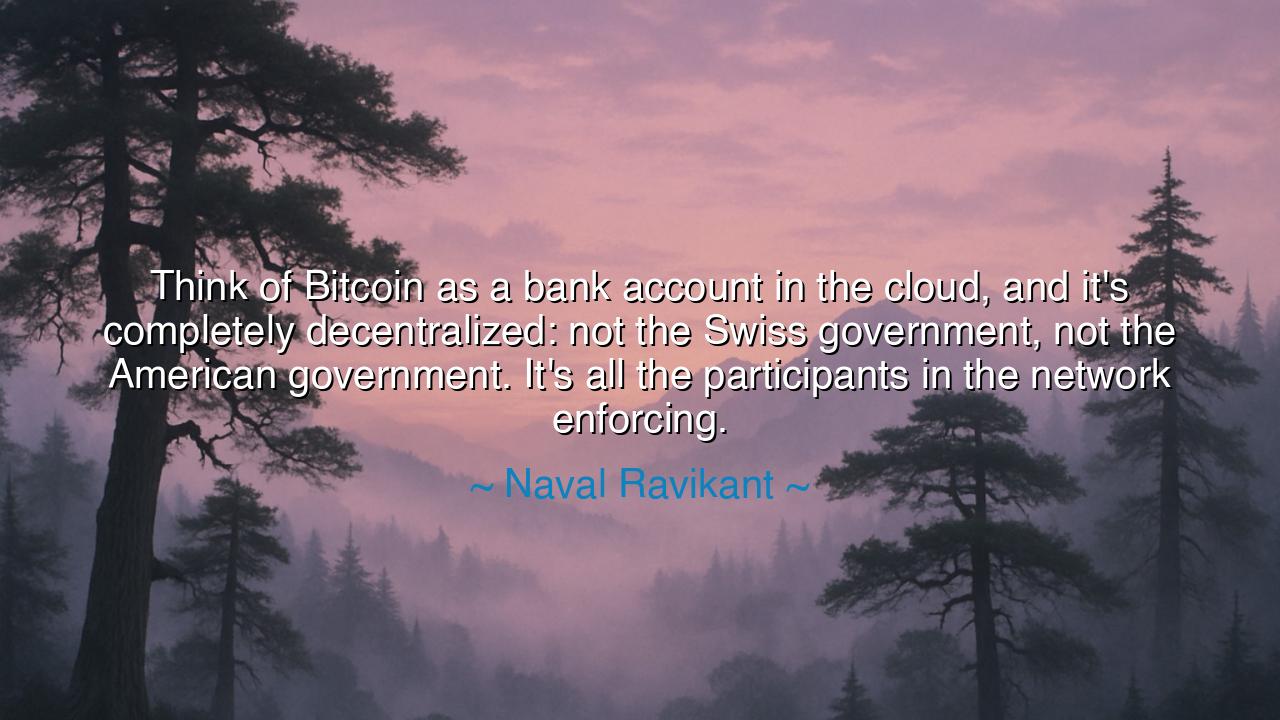
Think of Bitcoin as a bank account in the cloud, and it's
Think of Bitcoin as a bank account in the cloud, and it's completely decentralized: not the Swiss government, not the American government. It's all the participants in the network enforcing.






In the age of iron and empire, men fought for land, for gold, for the power to command. But in our time—the age of light and information—power has taken a new form, woven not from steel but from code, and guarded not by kings but by consensus. It was in this turning of the ages that Naval Ravikant, the philosopher of the digital frontier, spoke his words: “Think of Bitcoin as a bank account in the cloud, and it’s completely decentralized: not the Swiss government, not the American government. It’s all the participants in the network enforcing.” These words, though modern in tongue, echo an ancient longing: the yearning for freedom without masters, for wealth without bondage, for trust that is born not of authority, but of truth.
Long before Bitcoin, men built their faith upon institutions—banks, empires, nations. They trusted these bodies to hold their treasure, to honor their labor, to guard their dreams. But time and power have a way of eroding trust. The vaults of the mighty grew deep, yet the hands that guarded them grew greedy. Throughout history, whenever gold was gathered into too few hands, corruption followed. Empires rose and fell upon the breaking of that sacred trust. And so Ravikant’s vision was not merely about money—it was about restoring trust to the people, spreading it across the world like light that cannot be captured.
Consider the story of Renaissance Florence, where the Medici banks ruled the commerce of Europe. They held the fortunes of kings and popes, and with that power came both prosperity and peril. When trust faltered, the city shook. One collapse could bring ruin to nations, for the power of wealth was centralized in a few vaults guarded by men. The lesson was ancient even then: that whenever trust rests in a single throne, it becomes vulnerable to the flaws of its keeper. Bitcoin, by contrast, is a treasury with no walls, a bank account in the cloud watched not by rulers but by mathematics and the will of a million minds.
To call it decentralized is to invoke one of the deepest principles of liberty. Just as no man should rule another without consent, no single institution should rule over value itself. In Ravikant’s teaching, the network of participants enforcing the system stands as a living symbol of equality—a digital agora where all are both citizens and guardians. Each transaction is witnessed by all, carved into a ledger that cannot be forged or forgotten. It is as if mankind, weary of false prophets and collapsing currencies, has written a new covenant: “In code we trust, for code cannot lie.”
Yet this freedom is not without its tests. For as in all revolutions, there are those who fear what they cannot control. Governments that once claimed to protect their citizens’ wealth now tremble before a currency they cannot bend. Some call it rebellion, others call it salvation. But history will name it as it names all great transformations: an awakening. For Bitcoin is not merely a coin—it is a declaration that the right to store and transfer value belongs to the individual, not to the state. It is the digital echo of the old cry for independence that once rang from the mouths of those who dared to be free.
Think, too, of the countless people throughout the world who live under regimes that strangle their wealth, seize their labor, and silence their voices. To them, this bank in the cloud is more than an invention—it is refuge. A farmer in Venezuela, a merchant in Nigeria, a teacher in Iran—each finds in this invisible network a way to keep what is rightfully theirs. No government decree can freeze the chain; no army can storm the algorithm. Here, for the first time, humanity has built something that belongs to no one and to everyone alike.
The lesson, my child of tomorrow, is not merely about Bitcoin or wealth, but about freedom through responsibility. For in a world without masters, every man becomes his own steward. The network enforces fairness, but it is the people who must guard its integrity. Do not seek to destroy the old, but to transcend it. Learn the principles of the new—understand the code, the ethics, the discipline that self-sovereignty demands. To be free is not to do as you please, but to live by truth so pure that no power can corrupt it.
And so, remember this: every great age is built upon a new form of trust. Once it was the temple, then the crown, then the bank. Now, it is the network—a vast and living testament to human unity without hierarchy. Naval Ravikant spoke not only of money, but of destiny. For as long as people remain connected by shared truth, not by fear, the flame of freedom will endure. Guard it well, for it burns not in vaults of gold, but in the hearts and codes of those who dare to believe in a world where trust belongs to all.






AAdministratorAdministrator
Welcome, honored guests. Please leave a comment, we will respond soon